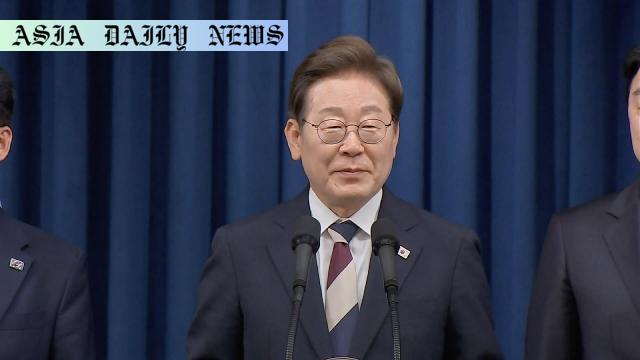South Korea Poll: Majority of South Koreans optimistic about President Lee Jae-myung’s five-year term and his ability to perform well.
- The latest Gallup Korea poll shows 70% of respondents predict positive performance by President Lee Jae-myung.
- Lee’s approval is higher than that of his predecessor, Yoon Suk-yeol but lower compared to earlier presidents like Moon Jae-in.
- Observers are keen to see his Cabinet selections and administrative actions in the coming days.

Introduction: A Strong Start for South Korea’s New President
The inauguration of a new leader often signals a period of hope and anticipation for a nation’s future. In South Korea, President Lee Jae-myung has entered office with significant public support, as revealed by Gallup Korea’s recent poll. Conducted with a sample size of 1,000 respondents, the survey indicates that 70% of South Koreans are optimistic about Lee’s ability to execute his presidential duties effectively during his five-year term. While the figure highlights a positive start, it also offers a point of comparison against the approval ratings of former presidents, showcasing both opportunities and challenges for the new administration.
Comparison with Past Leaders
Though President Lee’s approval rating is encouraging, it falls short when viewed against the backdrop of South Korea’s past leaders. Former President Moon Jae-in, for instance, held an impressive 87% approval rating in the early days of his presidency, while both Park Geun-hye and Lee Myung-bak achieved 79%. Conversely, Lee’s immediate predecessor, Yoon Suk-yeol, received a significantly lower rating at 60%. These comparisons underline how public perception is shaped by a combination of political dynamics, leadership style, and the socio-economic climate at the time.
Challenges Ahead: Governance and Cabinet Appointments
Unlike his predecessors, President Lee has had to assume office without a transition period due to the impeachment of former President Yoon Suk-yeol. This absence of preparation time poses challenges, as Lee’s administration is still in the process of filling key Cabinet positions. Observers are watching closely to see how the President selects his ministers, as these appointments will set the tone for his governance. Effective choices will not only validate public expectations but also lay the foundation for a stable administration in areas such as economic management, international relations, and domestic reforms.
Public Support: A Crucial Asset
The favorable poll results provide Lee Jae-myung with an essential asset: public trust. Such trust is critical for any government to implement bold policies, especially in a polarized political environment. However, sustaining this trust will require consistent engagement with the public, transparent governance, and tangible improvements in their quality of life. The new administration must address pressing issues such as economic challenges, housing concerns, and international relations, including maintaining stable ties with neighboring countries and allies.
Looking Ahead: Opportunities for Leadership
President Lee Jae-myung’s administration has a significant opportunity to redefine South Korea’s trajectory in the coming years. By focusing on inclusive governance, strategic economic planning, and international diplomacy, Lee can establish a legacy that resonates positively with the public. As the administration settles into its five-year term, citizens and analysts alike will be keenly observing, measuring success not only through opinion polls but also through tangible progress and effective leadership.



Commentary
Initial Impressions: A High-Stakes Presidency
President Lee Jae-myung’s term begins at a critical juncture in South Korean politics. With 70% of the population expressing confidence in his leadership, it is clear that there is significant optimism. However, the comparisons with past presidents like Moon Jae-in and Lee Myung-bak highlight the complexities of public expectations. The challenges ahead are immense, particularly with no transition period and an incomplete Cabinet at the start of his term. Nevertheless, the strong initial support offers a promising foundation.
The Importance of Public Trust
The results of the Gallup Korea poll underscore the importance of public trust in governance. While numbers alone cannot define a presidency, they serve as a barometer for the administration’s legitimacy and mandate. For Lee, the 70% approval rating is an endorsement and an obligation. To maintain and build upon this figure, Lee’s administration will need a clear strategy that addresses the immediate concerns of citizens such as economic growth, job creation, and social equity. Missteps early in the term could dissipate the goodwill, making public trust a precarious yet invaluable resource.
Opportunities and Risks
As South Korea’s new leader, Lee Jae-myung has a chance to shape the country’s future amid global uncertainties. His ability to unite a politically divided nation and address pressing domestic and international issues will be closely scrutinized. While his start is encouraging, the road ahead requires vision, resilience, and a commitment to public service. The administration’s performance in filling the remaining Cabinet positions, navigating economic challenges, and fostering diplomatic relations will ultimately define Lee’s legacy.